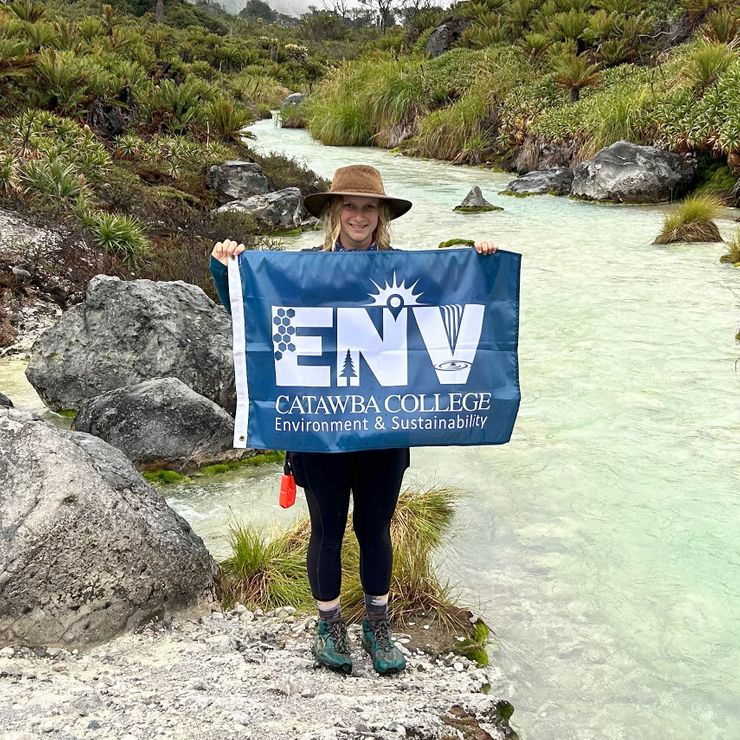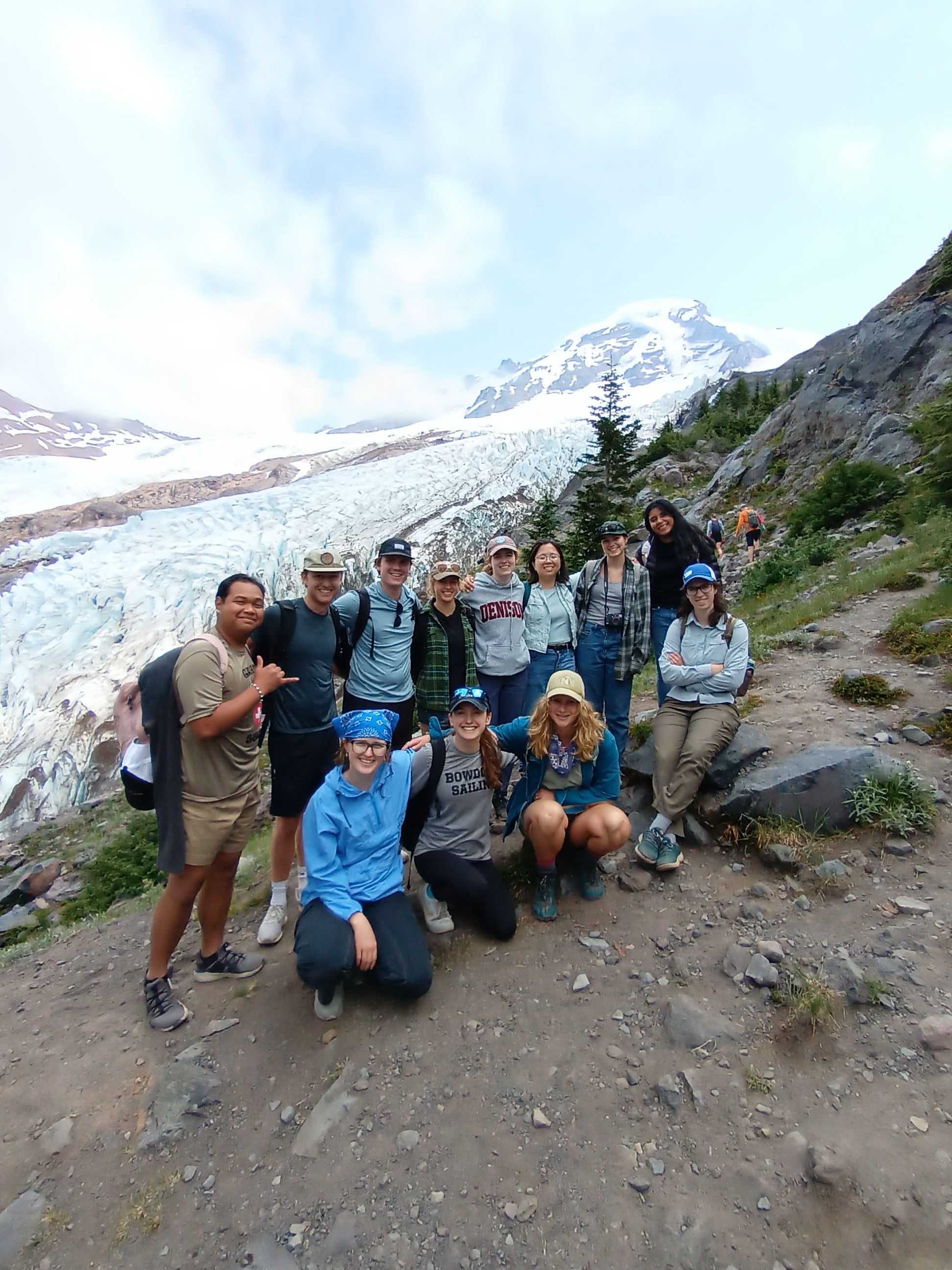Student Story
Larkin Garden '25

Larkin Garden '25
Pursing a Degree and a Childhood Dream
Graduation Year: 2025
Major: Environment & Sustainability, Concentration: Natural Resource Management
Minors: Geographic Information Systems & Technology, Ecology
Hometown: Asheville, NC
EXTRACURRICULAR ACTIVITIES:
Stewards Program, Catawba Outdoor Adventure Club
HOBBIES/INTERESTS:
Spending time outside with my dog.
Catawba's scholarships changed everything, and I am so grateful to not only have the opportunity to get a degree but also that I have been able to pursue a topic I am passionate about.”

Growing up, Larkin Garden always knew she wanted to pursue a degree in something related to environmental studies but wasn’t sure if it would be possible.
Catawba College made it possible. She said, “I chose to come to Catawba because of the scholarships available to ENV students. I worked construction throughout high school and was going to do a trade apprenticeship when I graduated. Even though I really wanted to go to college for some sort of environmental degree, I figured I just wouldn’t be able to afford it. Catawba’s scholarships changed everything, and I am so grateful to not only have the opportunity to get a degree but also that I have been able to pursue a topic I am passionate about.”
Beyond the financial support, the academic environment at Catawba has made a lasting impact on her experience as an ENV major. “I love the ENV classes and how supportive professors are to students. Instead of just being a number that they have to evaluate, I believe that professors at Catawba truly care about the well-being of students.”
This supportive academic atmosphere has not only fostered her growth as a student but has also reignited her childhood love for nature, allowing her to embrace the hands-on experiences that come with being an ENV major. She said, “Being an ENV major feels like getting to be a little kid again but while getting my degree. I had the privilege of growing up roaming around outside, basically only coming home for dinner. In high school I was so disappointed because I thought being an adult with responsibilities would mean no more traipsing through the woods or looking for critters. Rather than having to give up those things I’ve found as an ENV major that I actually get to fill my time with them.”
“Whether it’s looking for turtles in a vertebrate ecology class or getting to see the inner workings of a feral swine management project, what stands out about my experience as an ENV major is how much fun I have,” she added.
Along with looking for turtles in class and experiencing the inner workings of a swine management project, Larkin has also got to travel across the world with Catawba.
“I have had so many amazing travel opportunities with the college. During my first year I was able to work with fellow students on a research project studying the effects of flashing lights as predator deterrents on livestock corrals in Kenya. That summer we traveled to Rwanda to present a poster on our findings at the International Congress for Conservation Biology, which was an amazing opportunity to meet other people with similar interests and hear about their really cool and very impactful research. Afterward, we were able to hike to see the famous mountain gorillas in Volcanoes National Park. I will never forget the experience of having an adult male silverback lumber by me, or watching a youngster play with its gentle mother,” she said.
She added, “What really stuck with me from the research and trip was hearing about the implications of conservation through my fellow students' lived experiences and how important it is to think of people when trying to conserve a species or place. This experience has forever changed the lens through which I will look at conservation and the environment. Getting to meet and talk to people who deal with lions eating their livestock and livelihoods, or the farmers having to give up their land for mountain gorillas really drove home the importance of including and giving leadership to stakeholders who must deal with the potential consequences of conservation. I now understand that the best conservation practice is the one that will prioritize the rights, livelihood, and agency of the people having to coexist with target species or environments. Once stakeholders have these basic needs met, they are more open to and even passionate about protecting their natural resources and biodiversity.”
More recently, Larkin traveled this past year to Colombia to experience its biodiversity.
"It was really neat to be able to see so many different ecosystems and the organisms uniquely suited to living only in these ecosystems and nowhere else in the world. We learned a lot in class up until the trip, but getting to experience Colombia in person and through local guides who were deeply knowledgeable about so many species was incredible. I like to think having food poisoning was just part of the experience and that it speaks to how much I enjoyed the trip to say I would do it all over again.”
Larkin’s journey didn’t stop in Colombia, and while international travel has offered some unforgettable experiences, she found that smaller, more local trips with classmates have been just as meaningful.
She said, “Even though these huge international trips were incredible, the smaller trips I’ve had with classes during the semesters have been just as impactful. Getting to know other students better is one of the best parts about these trips because you learn about all the things you have in common and bond over getting rained on in a tent or being eaten alive by mosquitoes.”
She added, “I’ve been able to go camping in the mountains to search for salamanders, take a train to Washington, DC to learn about Bhutan, and even travel across the country to a conference in California. Getting to watch the sunrise over the Grand Canyon while it was snowing was unforgettable. We drove through so many different landscapes, and then to remember that they were all part of the United States was mind blowing. Getting to see animals like the buffalo that once roamed the Midwest in the millions was a reminder of both what we have lost and what we can still save.”
Larkin’s travels with Catawba are not over yet. In December, she will be traveling to Bonaire for a week of SCUBA diving with her Marine Science class. “I have always been fascinated by the ocean and this class/trip is something I have looked forward to since starting at Catawba. If I could have whatever job I wanted, it would be studying sharks. Bonaire isn’t known for having many sharks due to overfishing but I’m excited to be in their underwater realm!”
As Larkin looks ahead to her Bonaire adventure, her past summer internship in the Pacific Northwest offered its own set of thrilling challenges and invaluable experiences such as intense scientific diving, rescue training, learning how to use scientific equipment, and more.
“I had an incredible summer getting to dive and conduct research in the Pacific Northwest. Last spring I applied for a competitive program called Research Experience for Undergraduates (REU). There were 500 other applicants, and I was fortunate enough to get into one of the eight spots in Western Washington’s program at Shannon Point Marine Center (SPMC),” she said.
Larkin noted the best part of the experience was getting to do all parts of the REU program like watching orcas and hiking to a glacier while also taking an intense Scientific Diving class.
She said, “This certification was super intense as Scientific Diving is regulated by OSHA and has even more risks than recreational SCUBA diving (not to mention that the water never got above 48F). I completed a lot of training, rescue training, and drills such as rescuing an unconscious diver, bringing them to the surface, giving them rescue breaths, and swimming them to shore and carrying them far enough onto shore to administer appropriate care such as an AED. We also learned how to use scientific equipment like lift bags for moving massive concrete blocks underwater.”
By the end of the class, Larkin and others were deploying artificial reef modules for the Washington Department of Natural Resources and doing maintenance on hydrophones at 70ft below the surface for the Sea Mammal Research Unit. They also got to go on night dives, dives to 100ft, and learn how to use other technical diving set-ups and skills.
During her research experience, Larkin had to complete a research project. “For my REU research project, my partner and I collaborated with Puget Sound Restoration Fund (PSRF), an organization that is partnered with the NOAA and WA DNR to restore many species with great ecosystem and commercial value in the Pacific Northwest such as oysters, kelp, and abalone. PSRF gave us 600 juvenile abalone for our research project where we out planted them onto a reef and dove every hour for 16 hours and then twice a day for a week to monitor them,” she said.
She added, “Pinto abalone are functionally extinct in WA and severely threatened throughout their range because of overfishing. They have significant cultural value to many indigenous groups and serve important functions in their ecosystems. Their fishery has been closed since the 90s but their numbers have continued to plummet. PSRF has a hatchery where they raise pinto abalone to juveniles and outplant them at sites throughout the Puget Sound. Since the 2000s, they have out planted over 65,000 individuals with a long-term survival rate of 10%.”
Larkin and her partner focused their research on the out planting process, with the goal of improving survival rates. “We are pretty excited about our results and even more excited about being the first to document predation of outplanted juveniles by the snail Amphissa columbiana. PSRF has over 100,000 photos and videos at outplant sites but has never been able to document a predation event, and our discovery could have some significant implications for the future of the restoration process,” she said.
In the future, Larkin is looking forward to presenting her findings at conferences, with hopes of eventually publishing a paper on those same findings.
“This summer was so challenging but so rewarding and has opened many new opportunities for me to pursue a Scientific Diving job,” she said.
